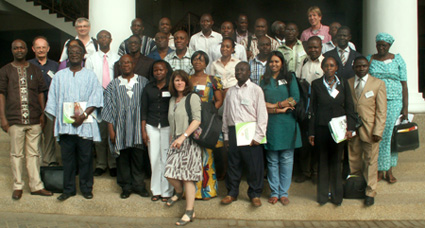The West African regional workshop on biopesticides, hosted in Accra on 20-21st March 2012, was held to mark the first successful registration of commercial environmentally friendly biological pesticides in Ghana.
 With a keynote speech by David Grzywacz of the Natural Resources Institute (NRI), the workshop marked the culmination of a long-term research initiative by NRI and collaborators with funding from DFID's Research into Use (RIU) programme that develops and promotes the use of new safe effective biological pesticides in West Africa.
With a keynote speech by David Grzywacz of the Natural Resources Institute (NRI), the workshop marked the culmination of a long-term research initiative by NRI and collaborators with funding from DFID's Research into Use (RIU) programme that develops and promotes the use of new safe effective biological pesticides in West Africa.
Pest control in Africa has so far depended upon the use of synthetic chemical pesticides. However, fears concerning the affect on workers' health, increased pest resistance and the negative environmental impact of these chemicals has led to the development of safer, more environmentally acceptable and cost effective biological control alternatives.
David Grzywacz and colleagues at NRI have been active developing biological pest control agents (BCA) in Ghana and Benin in West Africa, and Kenya and Tanzania in East Africa since the late 1990s with funding from the DFID RNRRS Crop Protection Programme. Their research has identified a number of new BCA, and in collaboration with other organisations African companies have been assisted to begin production of BCA in Africa.
In 2010 the DFID RIU Programme agreed to fund a project under its "Best Bets" initiative to fast track the first registration of BCA products in Ghana as this was a major constraint in getting valuable agricultural research into meaningful use. The project was led by The Real IPM Company Ltd Kenya and involved the Environmental Protection Agency Ghana and the University of Ghana. Technical support was provided by David Grzywacz and Dr Dave Moore of CABI. Through the project, the EPA successfully completed registration of three new commercial biopesticide products.
Dr Henry Wainwright, an ex staff member of NRI who went on to found Real IPM Kenya said "This meeting marks a major advance in helping agriculture in Ghana to meet the challenges of retaining and expanding its agricultural export business. This is a major contributor to generating employment and improving the livelihood of thousands of people on low income".

